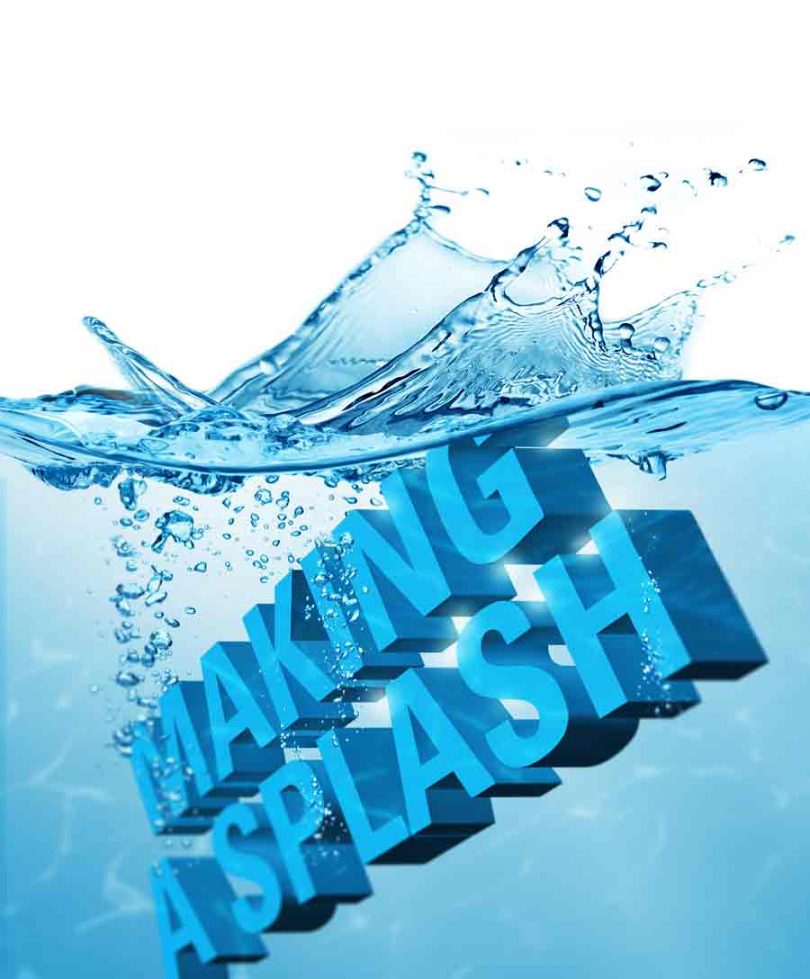Making a Splash
By: Rabbi Jonathan Gewirtz, The Observant Jew
Back in the early days of space travel, the astronauts would take off from land, but when they came back, they needed the forgiving nature of the ocean to soften their landings as the capsules were slowed by means of a parachute but still could not make a soft enough landing on the ground.
The phrase for this water landing was splashdown and it was as its name suggests: a landing that made a pretty big splash. There’s another phrase with a slightly different connotation. It’s called splashback. It’s when you throw or spill something but it splashes off the surface and bounces back onto you, usually with less than stellar results.
While cleaning out my car and getting rid of the empty wrappers, used envelopes, and half-empty water bottles, I had to spill out the water before I recycled the plastics. As I poured their contents onto my driveway, it happened. The water bounced off the asphalt and splattered on my pants! As do so many things, it got me to thinking. How could I spill out the water without looking like I got caught in the rain shower of a very low-hanging cloud?
I won’t mention going inside to spill the water in the sink because that would be too time-consuming and require too much effort. It was simply not an option. Instead, I found two ways to dispose of the water safely outside my home.
The first way was to pour it not onto the asphalt, but onto grass or onto the flower beds. They could probably use the water and it wouldn’t hurt that a bracha had been made on it which might imbue them with some extra holiness. Because the soil is more pliable and able to absorb the water like the ocean absorbed the impact of the space capsules, the water doesn’t splash back the way it does on the unforgiving asphalt.
The second way I found to avoid getting wet while emptying the bottles was to keep pouring the water onto the macadam driveway but to do it more slowly and from a much lower height, thus reducing how much of the liquid was splashed back onto me. This approach involved a bit more effort and patience, but was effective nonetheless.
The more I thought about it, the more I realized the life lesson I had just discovered. You see, Torah is compared to water, and like it was Eliezer, servant of Avraham, it is doled out to people from those who have received it from others. So, the idea of pouring water onto different surfaces made me think of sharing Torah concepts with people with different natures.
Some people are naturally more open to hearing words of Torah. Those are the people who are like the grass and flowers and are more accepting in varying degrees. You can share ideals and not worry that they will throw them back in your face. They are likely to benefit from it and use the “water” to grow.
Then you have the people who are simply not ready to listen. If you try to speak to them about HaShem and what their mission in life might be, you may very well crash and burn like a space capsule coming down in a field instead of in the ocean. Not only will your words not penetrate, but they will recoil in your face and make you look bad. There is only one thing you can do to mitigate the unwanted reaction: Lower yourself so the water isn’t coming from such a high place.
You see, when people speak to others about Torah principles, it’s quite common for them to mistakenly hold the Torah over the person’s head. They forget that the Torah is intended to perfect people, meaning that the people are the primary thing.
If you maintain a distance from others and look down on them, you can’t be surprised when your words backfire. The more pressure they feel to accept when they’re not open to it, the more they will push back. Continuing to press the issue will only leave you all wet.
However, if you focus on helping the other person, and finding a way to convey the message without making them uncomfortable, they will be more receptive of your words and able to grow. The way to do that is to humble yourself, take your time, and speak to them as an equal. Then your words will hit their mark and remain there, and the reception you get will be out of this world.
© 2018 – All Rights Reserved
Did you enjoy this column? Feedback is welcome and appreciated. E-mail info@JewishSpeechWriter.com to share your thoughts. You never know when you may be the lamp that enlightens someone else.
